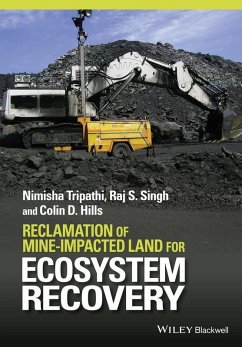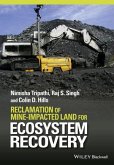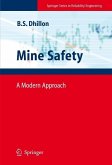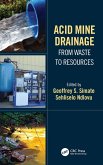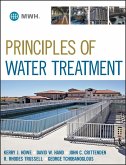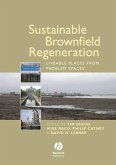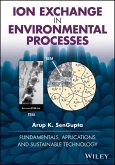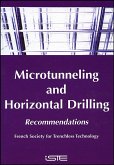Reclamation of Mine-impacted Land for Ecosystem Recovery (eBook, PDF)


Alle Infos zum eBook verschenken

Reclamation of Mine-impacted Land for Ecosystem Recovery (eBook, PDF)
- Format: PDF
- Merkliste
- Auf die Merkliste
- Bewerten Bewerten
- Teilen
- Produkt teilen
- Produkterinnerung
- Produkterinnerung

Hier können Sie sich einloggen

Bitte loggen Sie sich zunächst in Ihr Kundenkonto ein oder registrieren Sie sich bei bücher.de, um das eBook-Abo tolino select nutzen zu können.
Mining activities significantly impact the environment; they generate huge quantities of spoil, promote deforestation and the loss of agricultural production, as well as releasing contaminants that result in the loss of valuable soil resources. These negative impacts are now being recognized and this book shows how corrective action can be taken. The introduction of sustainable mining requires mitigation strategies that start during the mine planning stage and extend to after mineral extraction has ceased, and post-closure activities are being executed. Reclamation of Mine-impacted Land for…mehr
- Geräte: PC
- mit Kopierschutz
- eBook Hilfe
- Größe: 9.77MB
![Reclamation of Mine-impacted Land for Ecosystem Recovery (eBook, ePUB) Reclamation of Mine-impacted Land for Ecosystem Recovery (eBook, ePUB)]() Nimisha TripathiReclamation of Mine-impacted Land for Ecosystem Recovery (eBook, ePUB)108,99 €
Nimisha TripathiReclamation of Mine-impacted Land for Ecosystem Recovery (eBook, ePUB)108,99 €![Mine Safety (eBook, PDF) Mine Safety (eBook, PDF)]() Balbir S. DhillonMine Safety (eBook, PDF)113,95 €
Balbir S. DhillonMine Safety (eBook, PDF)113,95 €![Acid Mine Drainage (eBook, PDF) Acid Mine Drainage (eBook, PDF)]() Acid Mine Drainage (eBook, PDF)63,95 €
Acid Mine Drainage (eBook, PDF)63,95 €![Principles of Water Treatment (eBook, PDF) Principles of Water Treatment (eBook, PDF)]() Kerry J. HowePrinciples of Water Treatment (eBook, PDF)100,99 €
Kerry J. HowePrinciples of Water Treatment (eBook, PDF)100,99 €![Sustainable Brownfield Regeneration (eBook, PDF) Sustainable Brownfield Regeneration (eBook, PDF)]() Sustainable Brownfield Regeneration (eBook, PDF)88,99 €
Sustainable Brownfield Regeneration (eBook, PDF)88,99 €![Ion Exchange in Environmental Processes (eBook, PDF) Ion Exchange in Environmental Processes (eBook, PDF)]() Arup K. SenguptaIon Exchange in Environmental Processes (eBook, PDF)160,99 €
Arup K. SenguptaIon Exchange in Environmental Processes (eBook, PDF)160,99 €![Microtunneling and Horizontal Drilling (eBook, PDF) Microtunneling and Horizontal Drilling (eBook, PDF)]() French Society for TrenchlessTechnology (FSTT)Microtunneling and Horizontal Drilling (eBook, PDF)207,99 €
French Society for TrenchlessTechnology (FSTT)Microtunneling and Horizontal Drilling (eBook, PDF)207,99 €-
-
-
Dieser Download kann aus rechtlichen Gründen nur mit Rechnungsadresse in A, B, BG, CY, CZ, D, DK, EW, E, FIN, F, GR, HR, H, IRL, I, LT, L, LR, M, NL, PL, P, R, S, SLO, SK ausgeliefert werden.
- Produktdetails
- Verlag: John Wiley & Sons
- Seitenzahl: 208
- Erscheinungstermin: 4. Februar 2016
- Englisch
- ISBN-13: 9781119057918
- Artikelnr.: 44632601
- Verlag: John Wiley & Sons
- Seitenzahl: 208
- Erscheinungstermin: 4. Februar 2016
- Englisch
- ISBN-13: 9781119057918
- Artikelnr.: 44632601
Background and purpose 1 1.2 Key concepts and definitions 3 1.3 Supporting
information 5 1.4 Structure/layout of the book 6 2 Mining and ecological
degradation 11 2.1 Background 11 2.1.1 The need for land reclamation 12 2.2
Mining in India 12 2.2.1 Coal 14 2.2.2 Iron ore 15 2.2.3 Copper, lead and
zinc mining 16 2.2.4 Bauxite mining 18 2.2.5 Chromite mining 18 2.2.6
Limestone and other calcareous stone mining 19 2.3 Mining in other
countries 20 2.3.1 Mining in Australia 20 2.3.1.1 Coal 20 2.3.1.2 Uranium
21 2.3.2 Mining in the United States 21 2.3.2.1 Coal 21 2.3.2.2 Copper 21
2.3.2.3 Silver 21 2.3.2.4 Gold 21 2.3.2.5 Uranium 21 2.3.3 Mining in South
Africa 22 2.3.3.1 Coal 22 2.3.3.2 Iron ore 22 2.3.3.3 Gold 22 2.3.3.4
Diamond 22 2.3.3.5 Platinum and palladium 23 2.3.3.6 Chromium 23 2.3.4
Mining in the United Kingdom 23 2.3.4.1 Coal mining 23 2.3.4.2 Iron ore
copper, tin, lead and silver mining 24 2.3.4.3 Industrial minerals 24 2.3.5
Mining in China 25 2.3.5.1 Gold 25 2.3.5.2 Coal 26 2.4 Types of mine waste
disposal 27 2.5 Wastelands 29 2.6 Waste generation 30 2.7 Solid waste
generation 33 2.8 Ecological degradation and disturbance 35 2.9 Restoration
ecology and ecological restoration 39 2.10 Societal ecology 43 3 Regulation
of reclamation 47 3.1 Background 47 3.2 Mining laws and policies in India
48 3.2.1 Status of legislation for land reclamation 48 3.2.2 National
Mineral Policy: environmental protection 49 3.2.3 The Mines and Minerals
(Regulation and Development) - MMRD Act, 1957 49 3.2.4 The Mineral
Concession Rules, 1960 49 3.2.5 Mineral Conservation and Development Rule,
1988 49 3.2.6 Forest Conservation Rule, 1980 53 3.2.7 National Forest
Policy, 1988 53 3.2.8 Policy Statement on Abatement of Pollution,
Environment and Development, 1992 53 3.2.9 National Mineral Policy, 1993 53
3.2.10 National Conservation Strategy and Policy Statement on Environment
and Development 54 3.2.11 Environmental auditing and accounting of
geographical resources excavated from mines 54 3.2.12 EMP for sustainable
mining activities 54 3.2.13 Displacement in the mining sector 55 3.2.13.1
R&R policies 57 3.2.14 Gaps in mining and environmental legislation and
recommendations 58 3.3 International policies and legislations 58 3.3.1
Mine reclamation laws and policies in the United States 60 3.3.1.1 Intent
of the legislature 62 3.3.1.2 State policy for the reclamation of mined
lands 62 3.3.1.3 National Mining and Minerals Policy 63 3.3.2 Mining laws
and policies in the United Kingdom 63 3.3.3 Mining laws and policies in
European Union 64 3.3.3.1 Legislative framework for the safe management of
mining waste 65 3.3.4 Mining laws and policies in Australia 65 3.3.5 Mining
laws and policies in Canada 66 3.3.6 Mining laws and policies in South
Africa 67 3.3.7 Mining laws and policies in Sweden 68 4 Development
processes in disturbed ecosystems 71 4.1 Background 71 4.1.1 Conceptual
framework: disturbance 71 4.2 Disturbance and ecosystem processes 73 4.3
Succession 74 4.3.1 Conditions for succession 75 4.3.1.1 Initial soil
formation 75 4.3.2 Primary succession 76 4.3.3 Secondary succession 77 4.4
Ecosystem development in mine spoils 79 4.5 Options in restoration 80 4.5.1
Re-vegetation objectives 80 4.5.2 Implications for management 82 5 Benefits
of reclamation 85 5.1 Background 85 5.2 Establishment of ecological
succession 87 5.3 Recovery of damaged ecosystems 88 5.3.1 Biological
macro?]aggregate formation 90 5.3.2 Enhancement of soil fertility 92 5.3.3
Establishing a nutrient supply 93 5.3.4 Remediation of heavy metals 95
5.3.5 Carbon sequestration 100 5.3.5.1 The mechanism of carbon protection
101 5.3.6 Aesthetic enhancement 103 5.4 Rebuilding soil structure 104 5.4.1
Recharging soil microbe activity 105 5.4.1.1 Bacteria 105 5.4.1.2
Mycorrhiza 105 5.4.2 Re?]establishment of nutrient cycle 106 5.4.2.1 Carbon
cycle 107 5.4.2.2 Nitrogen cycle 107 5.5 Determining the effectiveness of
soil reclamation 108 5.6 Costs of bio?]reclamation and employment
generation 109 6 Best practice reclamation of mine spoil 111 6.1 Background
111 6.2 Soil management practices 111 6.2.1 Topography and soil erosion 112
6.2.2 Compaction and bulk density 112 6.2.3 Deep ripping/tillage 112 6.2.4
Ground cover residue management 113 6.2.5 Water management 113 6.2.6
Woodland management 118 6.2.7 Practices to enhance carbon sequestration 118
7 Carbon uptake into mine spoil in dry tropical ecosystems 121 7.1
Background 121 7.2 Soil carbon sequestration 124 7.3 Carbon allocation in
woody plants 125 7.4 Mine spoil 127 7.5 Role of mine soil properties on C
sequestration 129 7.6 Role of root formation in carbon sequestration 130
7.7 Reclamation via re-vegetation to enhance carbon sequestration 131 7.8
Ecosystem productivity and C sequestration 132 7.8.1 Topsoil 133 7.8.2
Selection of plant species 133 7.8.3 Amendments 135 7.8.3.1 Mulching 135
7.8.3.2 Organic amendments 136 7.8.3.3 Biosolids 136 7.8.3.4 Microbial
biomass 136 7.9 Carbon dioxide offset from mine soils 137 7.10 Carbon
accretion in revegetated mine soils 138 7.11 Carbon sequestration in mine
soil: The prospects for coal producers 144 7.12 Carbon sequestration
activities in India 145 7.13 The carbon budget for reclaimed mine
ecosystems 146 7.14 Implications for management 148 References 149 Index
181
Background and purpose 1 1.2 Key concepts and definitions 3 1.3 Supporting
information 5 1.4 Structure/layout of the book 6 2 Mining and ecological
degradation 11 2.1 Background 11 2.1.1 The need for land reclamation 12 2.2
Mining in India 12 2.2.1 Coal 14 2.2.2 Iron ore 15 2.2.3 Copper, lead and
zinc mining 16 2.2.4 Bauxite mining 18 2.2.5 Chromite mining 18 2.2.6
Limestone and other calcareous stone mining 19 2.3 Mining in other
countries 20 2.3.1 Mining in Australia 20 2.3.1.1 Coal 20 2.3.1.2 Uranium
21 2.3.2 Mining in the United States 21 2.3.2.1 Coal 21 2.3.2.2 Copper 21
2.3.2.3 Silver 21 2.3.2.4 Gold 21 2.3.2.5 Uranium 21 2.3.3 Mining in South
Africa 22 2.3.3.1 Coal 22 2.3.3.2 Iron ore 22 2.3.3.3 Gold 22 2.3.3.4
Diamond 22 2.3.3.5 Platinum and palladium 23 2.3.3.6 Chromium 23 2.3.4
Mining in the United Kingdom 23 2.3.4.1 Coal mining 23 2.3.4.2 Iron ore
copper, tin, lead and silver mining 24 2.3.4.3 Industrial minerals 24 2.3.5
Mining in China 25 2.3.5.1 Gold 25 2.3.5.2 Coal 26 2.4 Types of mine waste
disposal 27 2.5 Wastelands 29 2.6 Waste generation 30 2.7 Solid waste
generation 33 2.8 Ecological degradation and disturbance 35 2.9 Restoration
ecology and ecological restoration 39 2.10 Societal ecology 43 3 Regulation
of reclamation 47 3.1 Background 47 3.2 Mining laws and policies in India
48 3.2.1 Status of legislation for land reclamation 48 3.2.2 National
Mineral Policy: environmental protection 49 3.2.3 The Mines and Minerals
(Regulation and Development) - MMRD Act, 1957 49 3.2.4 The Mineral
Concession Rules, 1960 49 3.2.5 Mineral Conservation and Development Rule,
1988 49 3.2.6 Forest Conservation Rule, 1980 53 3.2.7 National Forest
Policy, 1988 53 3.2.8 Policy Statement on Abatement of Pollution,
Environment and Development, 1992 53 3.2.9 National Mineral Policy, 1993 53
3.2.10 National Conservation Strategy and Policy Statement on Environment
and Development 54 3.2.11 Environmental auditing and accounting of
geographical resources excavated from mines 54 3.2.12 EMP for sustainable
mining activities 54 3.2.13 Displacement in the mining sector 55 3.2.13.1
R&R policies 57 3.2.14 Gaps in mining and environmental legislation and
recommendations 58 3.3 International policies and legislations 58 3.3.1
Mine reclamation laws and policies in the United States 60 3.3.1.1 Intent
of the legislature 62 3.3.1.2 State policy for the reclamation of mined
lands 62 3.3.1.3 National Mining and Minerals Policy 63 3.3.2 Mining laws
and policies in the United Kingdom 63 3.3.3 Mining laws and policies in
European Union 64 3.3.3.1 Legislative framework for the safe management of
mining waste 65 3.3.4 Mining laws and policies in Australia 65 3.3.5 Mining
laws and policies in Canada 66 3.3.6 Mining laws and policies in South
Africa 67 3.3.7 Mining laws and policies in Sweden 68 4 Development
processes in disturbed ecosystems 71 4.1 Background 71 4.1.1 Conceptual
framework: disturbance 71 4.2 Disturbance and ecosystem processes 73 4.3
Succession 74 4.3.1 Conditions for succession 75 4.3.1.1 Initial soil
formation 75 4.3.2 Primary succession 76 4.3.3 Secondary succession 77 4.4
Ecosystem development in mine spoils 79 4.5 Options in restoration 80 4.5.1
Re-vegetation objectives 80 4.5.2 Implications for management 82 5 Benefits
of reclamation 85 5.1 Background 85 5.2 Establishment of ecological
succession 87 5.3 Recovery of damaged ecosystems 88 5.3.1 Biological
macro?]aggregate formation 90 5.3.2 Enhancement of soil fertility 92 5.3.3
Establishing a nutrient supply 93 5.3.4 Remediation of heavy metals 95
5.3.5 Carbon sequestration 100 5.3.5.1 The mechanism of carbon protection
101 5.3.6 Aesthetic enhancement 103 5.4 Rebuilding soil structure 104 5.4.1
Recharging soil microbe activity 105 5.4.1.1 Bacteria 105 5.4.1.2
Mycorrhiza 105 5.4.2 Re?]establishment of nutrient cycle 106 5.4.2.1 Carbon
cycle 107 5.4.2.2 Nitrogen cycle 107 5.5 Determining the effectiveness of
soil reclamation 108 5.6 Costs of bio?]reclamation and employment
generation 109 6 Best practice reclamation of mine spoil 111 6.1 Background
111 6.2 Soil management practices 111 6.2.1 Topography and soil erosion 112
6.2.2 Compaction and bulk density 112 6.2.3 Deep ripping/tillage 112 6.2.4
Ground cover residue management 113 6.2.5 Water management 113 6.2.6
Woodland management 118 6.2.7 Practices to enhance carbon sequestration 118
7 Carbon uptake into mine spoil in dry tropical ecosystems 121 7.1
Background 121 7.2 Soil carbon sequestration 124 7.3 Carbon allocation in
woody plants 125 7.4 Mine spoil 127 7.5 Role of mine soil properties on C
sequestration 129 7.6 Role of root formation in carbon sequestration 130
7.7 Reclamation via re-vegetation to enhance carbon sequestration 131 7.8
Ecosystem productivity and C sequestration 132 7.8.1 Topsoil 133 7.8.2
Selection of plant species 133 7.8.3 Amendments 135 7.8.3.1 Mulching 135
7.8.3.2 Organic amendments 136 7.8.3.3 Biosolids 136 7.8.3.4 Microbial
biomass 136 7.9 Carbon dioxide offset from mine soils 137 7.10 Carbon
accretion in revegetated mine soils 138 7.11 Carbon sequestration in mine
soil: The prospects for coal producers 144 7.12 Carbon sequestration
activities in India 145 7.13 The carbon budget for reclaimed mine
ecosystems 146 7.14 Implications for management 148 References 149 Index
181
